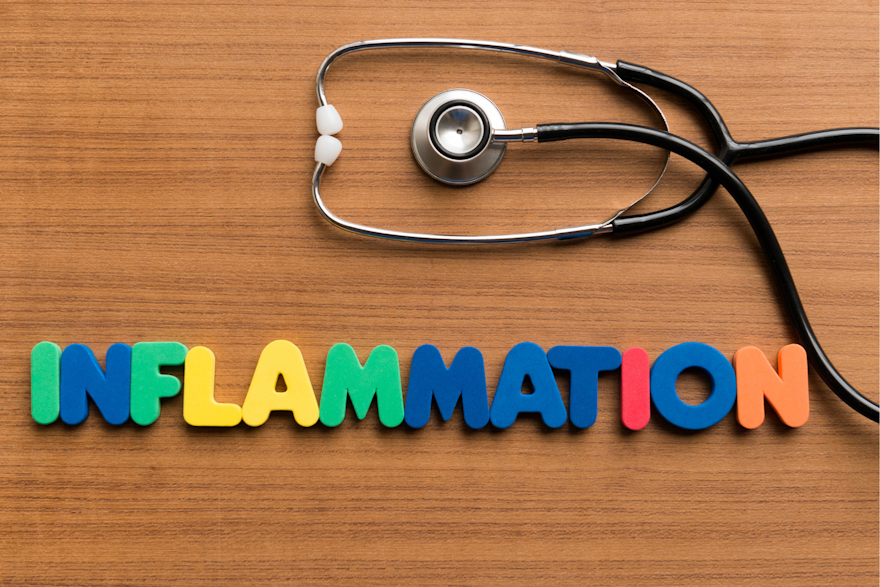L’inflammation est une réaction essentielle du système immunitaire pour protéger l’organisme contre les agressions extérieures, comme les infections ou les blessures. Cependant, lorsqu’elle devient chronique tout en restant de faible intensité, elle peut nuire à l'équilibre global du corps. Cette forme d’inflammation, souvent invisible, est connue sous le nom d’inflammation silencieuse ou inflammation de bas grade. Elle peut passer inaperçue pendant des années, mais son rôle est aujourd’hui reconnu dans de nombreuses maladies chroniques.
Dans cet article, nous explorerons en profondeur ce phénomène, ses causes, ses impacts sur la santé et les solutions naturelles pour le prévenir ou l’atténuer.
Qu’est-ce que l’inflammation silencieuse ?
Les bases de l’inflammation
L’inflammation est une réponse naturelle du corps à une agression, qu’elle soit d’origine externe (infection, blessure) ou interne (toxines, cellules endommagées). Elle peut être aiguë, avec des symptômes visibles (rougeur, douleur, chaleur, gonflement), ou chronique, lorsqu’elle persiste sur le long terme sans déclencher de manifestations claires.
Mécanismes de l’inflammation silencieuse
L’inflammation silencieuse repose sur une activation continue et modérée du système immunitaire. Elle se traduit par une production accrue de cytokines pro-inflammatoires, telles que le TNF-α (facteur de nécrose tumorale alpha) ou l’IL-6 (interleukine-6). Les cytokines sont des molécules de signalisation produites par les cellules immunitaires. Elles agissent comme des messagers chimiques pour coordonner les réponses inflammatoires. Si leur production devient excessive ou continue, elles peuvent endommager les tissus sains.
Coté analyses biologiques, la Protéine C-réactive (CRP) est marqueur sanguin qui reflète le niveau d’inflammation systémique. Un taux légèrement élevé de CRP est souvent le signe d’une inflammation de bas grade.
Ces mécanismes s’accompagnent d’un stress oxydatif, c’est-à-dire d’un déséquilibre entre la production de radicaux libres et les capacités antioxydantes de l’organisme, entraînant des dommages cellulaires.
Les causes de l’inflammation de bas grade
Une alimentation pro-inflammatoire : sucres raffinés et acides gras trans stimulent la production de cytokines pro-inflammatoires. Présents dans les aliments transformés, ils favorisent l’inflammation et le stress oxydatif.
Un excès de tissu adipeux : la graisse viscérale (située autour des organes) produit des molécules inflammatoires appelées adipokines, contribuant à l’état inflammatoire.
Un stress chronique : Le stress stimule la libération de cortisol, qui, à long terme, peut perturber la régulation de l’inflammation et aggraver le déséquilibre immunitaire.
Une dysbiose intestinale : un déséquilibre du microbiote intestinal (ensemble des bactéries présentes dans l’intestin) peut entraîner une perméabilité accrue de la paroi intestinale. Cela permet à des substances inflammatoires de pénétrer dans la circulation sanguine.
Les toxines environnementales : pollution, pesticides et produits chimiques perturbent les fonctions cellulaires et peuvent déclencher des réactions inflammatoires.
Les impacts sur la santé
Bien que silencieuse, cette inflammation joue un rôle clé dans plusieurs maladies chroniques :
- Maladies cardiovasculaires : L’inflammation contribue à la formation de plaques dans les artères (athérosclérose), augmentant le risque de crise cardiaque ou d’accident vasculaire cérébral.
- Syndrome métabolique et diabète : L’inflammation altère la sensibilité des cellules à l’insuline, favorisant le diabète de type 2.
- Troubles cognitifs : Elle est impliquée dans des maladies neurodégénératives comme Alzheimer, en perturbant les fonctions cérébrales.
- Douleurs chroniques : Les réactions inflammatoires dans les articulations ou les muscles aggravent les douleurs persistantes. La fibromyalgie peut en être un exemple.

L'importance d'une hygiène de vie pour réduire l'inflammation silencieuse
Une hygiène de vie équilibrée constitue un pilier fondamental pour prévenir et diminuer cette inflammation de bas grade. Les choix que nous faisons au quotidien en matière d’alimentation, de gestion du stress, d’activité physique influencent directement les processus inflammatoires de notre organisme.
L’alimentation anti-inflammatoire
Une alimentation saine et variée peut considérablement réduire les marqueurs d’inflammation. Il est conseillé de privilégier les aliments riches en antioxydants, tels que les fruits et légumes colorés (baies, épinards, brocoli), qui neutralisent les radicaux libres responsables du stress oxydatif. Les acides gras oméga-3, présents dans les petits poissons gras (anchoix, sardines, maquereau), les graines de lin et les noix, sont particulièrement efficaces pour moduler la production de cytokines pro-inflammatoires. À l’inverse, il convient de limiter les aliments ultra-transformés riches en sucres raffinés, graisses saturées et acides gras trans, qui exacerbent l’inflammation en stimulant la production de médiateurs inflammatoires.
Certaines épices, comme le curcuma et le gingembre, ont démontré des effets anti-inflammatoires significatifs grâce à leur capacité à inhiber des molécules pro-inflammatoires telles que le TNF-α et l’IL-6. Enfin, une bonne hydratation, à travers la consommation d’eau et de tisanes riches en polyphénols (thé vert, camomille), contribue également à maintenir un équilibre cellulaire sain.
La gestion du stress
Le stress chronique est un déclencheur majeur d’inflammation silencieuse. En réponse à un stress prolongé, l’organisme libère du cortisol, une hormone qui, bien qu’anti-inflammatoire à court terme, devient pro-inflammatoire lorsqu’elle est sécrétée en excès sur le long terme. Des pratiques comme la méditation, la cohérence cardiaque, le yoga ou même des promenades en pleine nature permettent de réduire le stress en calmant le système nerveux. Ces techniques activent le système parasympathique, favorisant une diminution de l’activité inflammatoire systémique.
L’activité physique régulière
L’exercice modéré est un puissant régulateur de l’inflammation. Il stimule la libération de molécules anti-inflammatoires, telles que les myokines, produites par les muscles pendant l’effort. Une activité régulière, comme la marche rapide, le vélo ou la natation, améliore également la sensibilité à l’insuline et réduit la graisse viscérale, une source majeure de cytokines pro-inflammatoires. Cependant, il est important d’éviter les exercices intenses prolongés, qui peuvent entraîner une augmentation transitoire de l’inflammation et du stress oxydatif.
L’importance d’un sommeil réparateur
Un sommeil insuffisant ou de mauvaise qualité perturbe les processus biologiques qui régulent l’inflammation. Les phases profondes du sommeil, notamment le sommeil paradoxal, sont essentielles pour restaurer l’équilibre des systèmes immunitaire et hormonal. Un sommeil de qualité réduit les niveaux de cytokines pro-inflammatoires et régule la production de cortisol. Pour optimiser son sommeil, il est conseillé d’instaurer une routine régulière, de limiter l’exposition aux écrans en soirée et de maintenir une chambre sombre, calme et fraîche (18-19°C).
En adoptant une hygiène de vie globale qui inclut une alimentation adaptée, une gestion active du stress, une activité physique modérée et un sommeil de qualité, il est possible de réduire efficacement l’inflammation silencieuse. Ces changements, loin d’être anecdotiques, agissent en synergie pour maintenir un état de santé optimal et prévenir l’apparition de nombreuses maladies chroniques.
Les solutions naturelles pour maîtriser l’inflammation silencieuse
Les Oméga-3 : on trouve les acides gras oméga-3 dans l'alimentation mais quand les apports ne sont pas suffisantes, un supplémentation peut être envisagée. La dose recommandée est alors de 1 à 3 g par jour d’EPA et DHA combinés.
Les Probiotiques : les souches comme Lactobacillus rhamnosus ou Bifidobacterium longum améliorent l’équilibre du microbiote et réduisent l’inflammation systémique. Ils peuvent etre consommés sous forme de cure de complément alimentaire ou à travers des aliments fermentés (kéfir, yaourt nature).
Les Plantes médicinales : certaines plantes sont reconnues pour avoir une action anti-inflammatoire. On retrouve la Bromélaïne, qui extraite de l’ananas, aide à réduire l’inflammation articulaire ou encore Boswellia serrata, utilisée en médecine ayurvédique pour les douleurs articulaires.
Huiles essentielles: les HE d'Encens (Boswellia) ou de Gaulthérie sont reconnues pour leurs propriétés anti-inflammatoires. On peut les appliqur localement ou en inhalation.
L’inflammation silencieuse est un ennemi discret, mais puissant, de notre santé. En adoptant une approche proactive incluant des changements alimentaires, des compléments validés scientifiquement et des pratiques naturelles, il est possible de réduire cet état inflammatoire et de prévenir les maladies chroniques. Cette démarche intégrative est essentielle pour préserver un équilibre durable entre le corps et l’esprit.
Références scientifiques
- Calder, P. C. (2018). "Omega-3 fatty acids and inflammatory processes: From molecules to man". Journal of Clinical Nutrition.
- Aggarwal, B. B., & Harikumar, K. B. (2009). "Potential therapeutic effects of curcumin, the anti-inflammatory agent". Advances in Pharmacological Sciences.
- Hotamisligil, G. S. (2006). "Inflammation and metabolic disorders". Nature, 444(7121), 860–867.
- Coussens, L. M., & Werb, Z. (2002). "Inflammation and cancer". Nature, 420(6917), 860–867.
- Hill, C. et al. (2021). "Probiotics and inflammation: Mechanisms of action". Gut Microbes.


